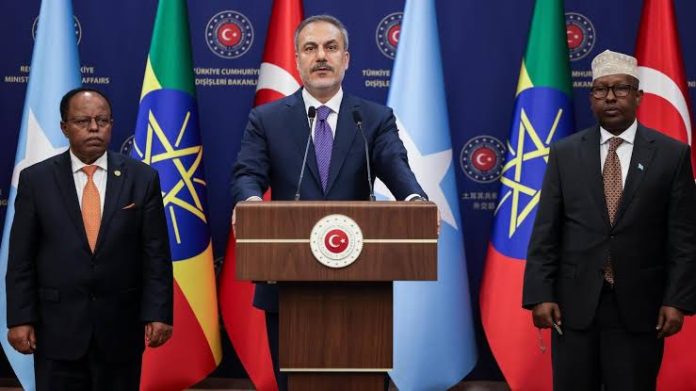Facebook Twitter (X) Instagram Somali Magazine - People's Magazine
Ethiopia and Somalia have reached an agreement to de-escalate tensions surrounding a maritime deal signed by Ethiopia with the breakaway region of Somaliland. After months of strained relations, the two nations have pledged to cooperate and begin detailed negotiations by February 2025.
The breakthrough was announced following mediation led by Turkish President Recep Tayyip Erdoğan, culminating in the signing of the “Ankara Declaration.”
The Maritime Deal and Its Fallout
The diplomatic row began on January 1, 2024, when Somaliland’s President Muse Bihi Abdi and Ethiopian Prime Minister Abiy Ahmed signed a controversial agreement. The deal granted Ethiopia a 50-year lease on 20 kilometers of Somaliland’s coastline in exchange for Ethiopian recognition of Somaliland as an independent state.
The Somali federal government immediately rejected the agreement, branding it a “blatant violation” of Somalia’s sovereignty and territorial integrity.
Ankara Declaration: Key Agreements
Under the Ankara Declaration, Ethiopian Prime Minister Abiy Ahmed and Somali President Hassan Sheikh Mohamud reaffirmed their commitment to territorial sovereignty and international law. Both leaders acknowledged the need for mutual respect and collaboration to promote regional stability.
“The Leaders of Somalia and Ethiopia reaffirmed their respect and commitment to one another’s sovereignty, unity, independence, and territorial integrity,” the declaration stated.
The two sides also agreed to commence technical negotiations by February 2025, with Turkey facilitating the discussions. These negotiations will determine the specifics of Ethiopia’s maritime access while respecting Somalia’s territorial authority. The talks aim to finalize and sign agreements within four months.
Erdogan’s Role in Mediation
President Erdoğan praised the leaders for their willingness to compromise. “I would like to congratulate both brothers for coming to a resolution,” he said at a joint press conference.
Erdoğan’s mediation was pivotal in securing this accord, underscoring Turkey’s growing role in Africa’s geopolitical dynamics.
Statements from Somali and Ethiopian Leaders
President Mohamud expressed optimism about the agreement, emphasizing shared regional interests. “Somalia will remain a true friend of Ethiopia,” he said, noting that the resolution marked the end of recent tensions.
Prime Minister Abiy echoed similar sentiments, describing the discord as a “misunderstanding.” He highlighted the deep cultural and historical ties between the two nations, stating, “We are not only neighbors but brothers and sisters.”
Somaliland’s Status Remains Contentious
Despite the agreement, Somaliland’s quest for international recognition remains unresolved. While Ethiopia has not officially recognized Somaliland as an independent state, it defended the maritime lease as a bilateral agreement that benefits both parties.
Somalia continues to view Somaliland as an integral part of its territory. Since declaring independence in 1991, Somaliland has operated as a de facto state but lacks international recognition.
Regional Implications
The deal could have significant implications for the Horn of Africa, where Ethiopia’s landlocked status has long been a challenge for trade and economic growth. Reliable access to the sea is critical for Ethiopia’s ambitions of becoming a regional economic powerhouse.
At the same time, Somalia aims to maintain its territorial integrity while balancing relations with regional powers.
Moving Forward
Both countries have pledged to avoid further conflicts and work towards common prosperity. The upcoming technical negotiations will be crucial in shaping the final arrangements and ensuring that both parties’ concerns are addressed.
Observers hope this resolution will foster greater cooperation and stability in the Horn of Africa, a region often marred by political and economic volatility.

